 Petzlover
Petzlover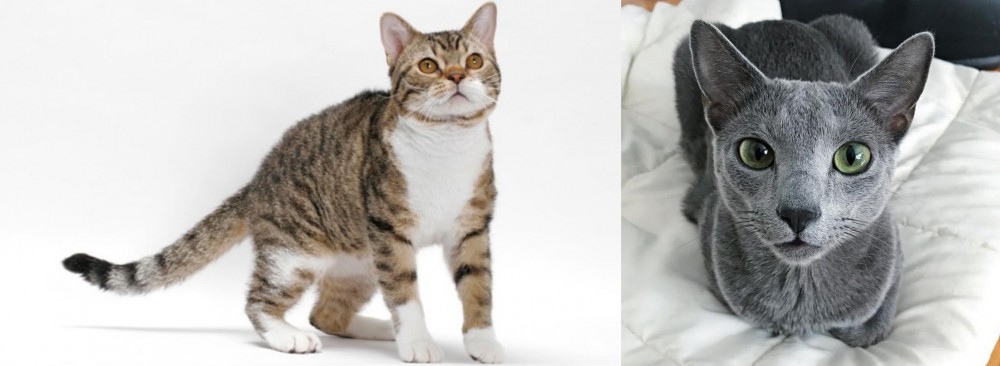 American Wirehair is originated from United States but Blue Russian is originated from Russia. Both American Wirehair and Blue Russian are having almost same weight. American Wirehair may live 4 years less than Blue Russian. Both American Wirehair and Blue Russian has same litter size. Both American Wirehair and Blue Russian requires Low Maintenance.
American Wirehair is originated from United States but Blue Russian is originated from Russia. Both American Wirehair and Blue Russian are having almost same weight. American Wirehair may live 4 years less than Blue Russian. Both American Wirehair and Blue Russian has same litter size. Both American Wirehair and Blue Russian requires Low Maintenance.
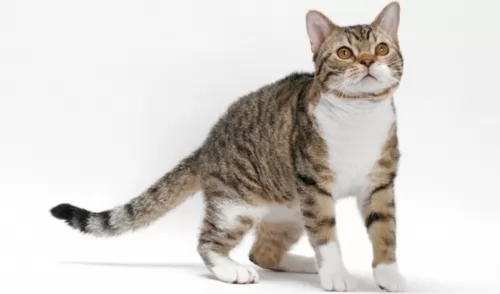 The American Wirehair started as a spontaneous mutation so that somewhere along the line, an unusual litter with this unique wiry type of fur was born.
The American Wirehair started as a spontaneous mutation so that somewhere along the line, an unusual litter with this unique wiry type of fur was born.
The cat hails from New York and it was in 1966 that a couple of barn cats had a litter of kittens, some of which were born with this peculiar wiry hair. Only one kitten survived – a male – and later it was discovered that the gene responsible for the wirehair coat was dominant so that only one parent required the gene to produce Wirehair offspring.
Today, all American Wirehairs are descendants of this one surviving male kitten. Today the breed is still fairly rare. It is, however, recognized by the four largest North American cat associations.
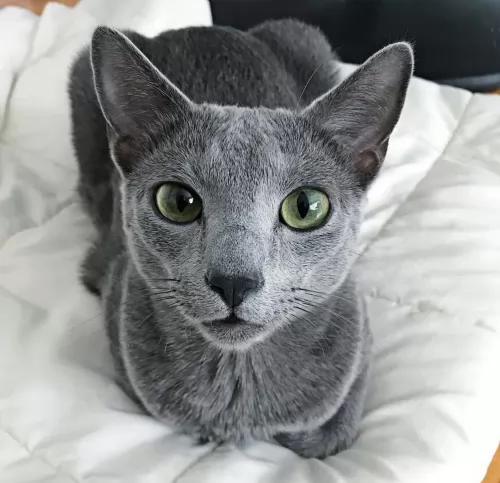 The Blue Russian is a rare cat and not much is known about its origins, but it is believed that the cat comes from northern Russia.
The Blue Russian is a rare cat and not much is known about its origins, but it is believed that the cat comes from northern Russia.
The Cat Fanciers Association believes that the cat descended from cats kept by Russian Czars. Research tells us that there is no mention of the Blue Russian until the 19th century. The Russia Blue made its first public appearance in 1875, being exhibited at London’s Crystal Palace as the ‘Archangel Cat’.
By 1912, the Russia Bue was given its own classification after its introduction to the USA in the early 1900s.
 The American Wirehair is a medium-sized cat, strong and powerful, and can weight 5, 6 or 7 kg.
The American Wirehair is a medium-sized cat, strong and powerful, and can weight 5, 6 or 7 kg.
The head is in proportion to the body and the cat has a strong muzzle and chin. The ears are medium-sized and are rounded at the tips while the eyes are large, round, and set well apart.
It’s the coat that draws attention as unlike a regular cat’s silky fur, the fur of this cat is springy, coarse and wiry to the touch. The coat can be any color or pattern. It is the cat’s very coat that distinguishes it from all other breeds.
With this coat, the less grooming the better. Brushing or combing can damage it, so unless he is shedding heavily, leave it alone.
The only other care he needs really is nail trimming, to check inside his mouth for bad teeth and to also check inside his ears for redness. Both the teeth and the ears can be a source of pain for your pet.
The American Wirehair may have a harsh coat but there is nothing harsh about his personality at all. He is amicable and loving, getting on well with all members of his human family.
He is an independent cat and while he loves spending time with his family, he is quite capable of spending time on his own as well.
The American Wirehair is a playful cat so you want to give him some toys to entertain himself for when you’re not around.
 The Russian Blue is a medium-sized cat with a long, finely-boned boy. It is a slender cat, but he appears larger because of his dense double coat.
The Russian Blue is a medium-sized cat with a long, finely-boned boy. It is a slender cat, but he appears larger because of his dense double coat.
He weighs in the region of 3 – 6kg. In spite of the dense and luxurious short silvery coat, the cat doesn’t shed much. The coat can in fact be a silvery shade to a dark slate grey. The eyes are a beautiful green, the ears widely spaced and slightly rounded at the top.
The Russian Blue is a sweet-tempered cat who becomes attached to his human owner and who will even follow his owner much like a dog.
This particular cat breed may be quite shy, but he becomes social around his family members and may even be reluctant to share time with strangers.
He also doesn’t mind spending some time alone if you have to work. Curious and intelligent the Russian Blue is somewhat reserved but he makes a great companion as he is sensitive to his owner's moods.
 The American Wirehair makes a splendid pet, and while he isn’t the best breed for children, he can make a good pet with those children who have been taught kindness, gentleness and respect for animals.
The American Wirehair makes a splendid pet, and while he isn’t the best breed for children, he can make a good pet with those children who have been taught kindness, gentleness and respect for animals.
He is calm, quiet, dependent, and sociable and by providing him with a good home, he’ll prove to be a wonderful pet and companion.
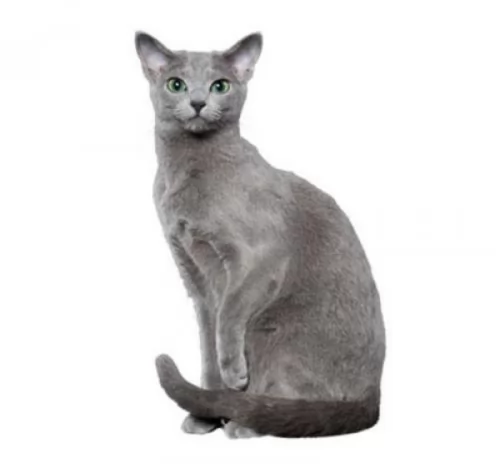 Russian blue cats are such intelligent creatures and he will require some mental stimulation because of it.
Russian blue cats are such intelligent creatures and he will require some mental stimulation because of it.
He loves mealtimes, but remember to not overfeed him as this shortens his lifespan.
He is a vocal cat and will tell you when he is hungry or he wants to play.
These cats don’t like too many changes so keep things the same for him.
When you try to keep your lovely Blue Russian happy, you’ll be rewarded by having a fantastic feline companion.
 The American Wirehair is a healthy type of cat but any cat can develop health issues.
The American Wirehair is a healthy type of cat but any cat can develop health issues.
Be aware of Hypertrophic cardiomyopathy – a common form of heart disease in cats where there is the thickening of the heart muscle.
Be careful of overfeeding your cat as obesity is a major contributory disease to many illnesses that a cat gets. Excess weight can contribute to diabetes and arthritis and put pressure on your cat’s joints. Certainly, carrying extra weight can shorten your cat’s life. Make sure your cat gets smaller, healthier meals and that he is active and exercised.
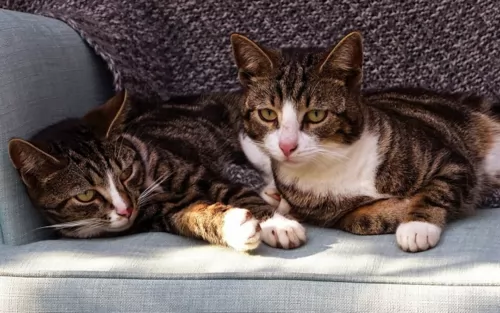 Brush the cat gently once a week. Your cat will love the connection you and he has. While you brush him, make a point of checking inside his ears and inside his mouth as well. It is also time to trim his nails. If you are hesitant to do this, ask you vet for suggestions or you can make use of a pet groomer too.
Brush the cat gently once a week. Your cat will love the connection you and he has. While you brush him, make a point of checking inside his ears and inside his mouth as well. It is also time to trim his nails. If you are hesitant to do this, ask you vet for suggestions or you can make use of a pet groomer too.
Make sure your pet cat is free from parasites such as fleas, ticks and heartworm. Your vet can recommend a treatment and it is also a good idea to talk to your vet about vaccines for your cat.
Have your American Wirehair spayed or neutered to prevent unwanted kittens and to promote better health for your cat.
Always choose healthy food for your pet, bearing in mind that cats are carnivores, which means that you need to choose cat-food for your pet that has fish and meat in it. It can be difficult making good homemade food for your cat but there are excellent commercially prepared cat foods to ensure your cat gets the correct balance of nutrients and calories. Bear in mind that your cat's nutritional requirements change through their different stages of life.
 Part of caring for a cat as a responsible pet owner comes from feeding your pet. The Russian Blue is a cat that enjoys his food so you will have to look out for overfeeding.
Part of caring for a cat as a responsible pet owner comes from feeding your pet. The Russian Blue is a cat that enjoys his food so you will have to look out for overfeeding.
A cat that is overweight can start developing joint problems and diabetes. Rather stick to scheduled meals so that you can know exactly what your feline pet is getting. Such a beautiful cat needs the best food there is to keep the coat shiny and healthy and to prevent illness.
Always read the food labels to ensure the best ingredients and the right portion sizes. Make sure your cat gets food that is meat protein-rich as a cat is a carnivore.
Water is another important part of your Blue Russian’s diet. Fresh cool water should be available for your cat night and day. Water bowls are good but a water fountain is a tantalizingly attractive way for your pet to be attracted to drinking more water.
Make sure that you rake up all your cat’s droppings from the litter box every day as the Russian Blue is a hygienic cat and wants a clean litter box. Make sure the litter box is in a nice quiet spot for your cat.
The cat has a dense coat but isn’t a heavy shedder and requires very little grooming.
Ensure a decent bed for your Bombay cat. Any soft cat bedding will do, and while some cats like a simple flat mattress-type bedding arrangement, other cats like the idea of getting into a bed that provides some privacy.
You just have to find yourself a decent pet shop because when you do, you’ll find a host of soft, warm, fully washable blankets and pillows for your pet. Once you’ve decided on the right bed and a nice quiet spot, your cat will have a complex issue sorted out as some cats can be fussy with their sleeping arrangments.
Make sure your cat is neutered or spayed to avoid unwanted kittens. Neutering offers health benefits, reducing the risk of different cancers. Your cat also no longer has the desire to fight over mates and territory.